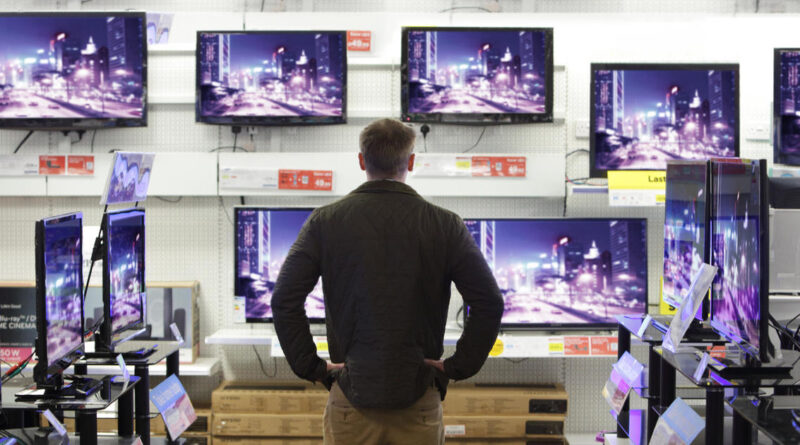Trump tariffs could make these items more expensive
Prices could rise on a variety of goods shipped to the U.S. from overseas under tariffs that President-elect Donald Trump has threatened to impose as soon as he takes office next year, according to experts.
Trump on Monday pledged to put a 25% tariff on all products from Mexico and Canada, along with a 10% levy on Chinese goods, in an effort to crack down on illegal immigration and illicit drugs flowing into the U.S. The tariffs are not certain to go into effect, while if they are implemented their impact would depend on how they are structured and if certain categories are exempted.
Trump and his allies, including his choice for Treasury Secretary, Scott Bessent, have argued that his first-term tariffs didn’t boost inflation, and that import taxes can provide valuable benefits to American workers and businesses. Among them, Trump has said, are protecting U.S. manufacturing jobs and boosting federal revenue, although tariffs are paid by importers and often passed onto consumers in the form of higher prices.
For their part, experts and business groups are clear that tariffs wold lift prices. A barrage of new duties on foreign imports would likely boost consumer costs on everything from vacuum cleaners to tiki torches, which are largely imported from China and are already subject to tariffs, according to Scott Lincicome, a trade expert at the Cato Institute, a public policy research group.
“A lot vacuum cleaners are made in China, so that’s one I could be sort of confident you’re going to see some price effects on,” he said.
Consumer electronics
The tariffs also would reduce American consumers’ spending power by $90 billion on products including TVs, headphones, laptops and tablets, video game consoles, smart phones and other electronics, according to the Consumer Technology Association.
The trade group — which modeled the impact of a 10% tariff on Chinese imports, coupled with a 60% levy on goods from the country that Trump previously floated — estimated that laptops and tablets would see the steepest price hikes, with costs surging as much as 45%. Video game consoles and smartphones could also see double-digit gains.
Researchers assumed retailers would pass all added costs related to tariffs along to consumers. In the smartphone category, the average increase in price would be $213 per device, according to CTA.
“The likelihood of retailers or any importer absorbing the tariff cost is very low, so the pass through to consumers will be quick,” said Ed Brzytwa, vice president of international trade at CTA. “On all the products we looked at, there are going to be price increases.”
Best Buy CEO Cory Barrie on Tuesday also said on the company’s earnings call that Trump’s proposed tariffs would force the retailer to raise costs on a range of consumer electronics, noting that “there’s very little in consumer electronics space that is not imported,” she said.
Footwear
Footwear is another goods category that experts are watching. According to Footwear Distributors and Retailers of America (FDRA), 99% of footwear sold in the U.S. is imported from other countries, with 56% of footwear by volume coming from China.
“We know that if they apply tariffs on Chines goods and Chinese footwear, it will hit working families the hardest,” FDRA CEO Matt Priest told CBS MoneyWatch.
Some retailers could also decide to hike prices whether or not they face added costs related to potential tariffs. “It’s a pretty handy excuse when you’re constant battle with consumers on price,” Lincicome said.
Home goods
A number of retailers have already suggested that the proposed tariffs could force them to raise prices. In an email to customers, filtered shower head maker Jolie said this week that tariffs on good made outside of the U.S. would “mean we would need to raise our prices.”
“If you’re considering buying a Jolie, now is a great time to lock in our current prices,” the company added. Currently, a shower head with a filter subscription costs $148. The company announced a “potential” new prices of $178.
Home furnishings giant Ikea told CNN that Trump’s tariffs, if enacted, would make it more difficult for the company to keep its prices low.
“Tariffs make it more difficult for us to maintain the low prices and be affordable for many people, which in the end is our goal,” Jesper Brodin, Ingka Group CEO, told CNN. “But it’s beyond our control. We will need to understand and adapt.”
Gas prices
Adding a 25% tariff to Canadian imports would impact crude oil imported from Western Canada and which is refined at U.S. facilities, according to Patrick De Haan, an analyst at Gas Buddy.
The biggest hit would be to drivers in the Great Lakes, Midwest and Rockies regions, which are reliant on gasoline that’s refined in the U.S. from Canadian crude, he added.
“You can’t simply process different oil overnight. It would take investments/years. More U.S. supply wouldn’t help,” he added.
The impact would result in higher gasoline prices in those regions between 25 cents to 75 cents a gallon, depending on seasonal and refining factors, he estiamted.
So should consumers be thinking about buying certain products now ahead of possible tariffs next year? Brzytwa thinks so.
“People should be thinking about buying now. From all indications we have, the Trump administration wants to move as fast as possible to impose much higher tariffs on imports from China, including products not yet subject to tariffs,” he said.
He added, “If I am a consumer thinking about something I would want to buy next year and know price might go up, I’d want to buy it sooner rather than later.”

